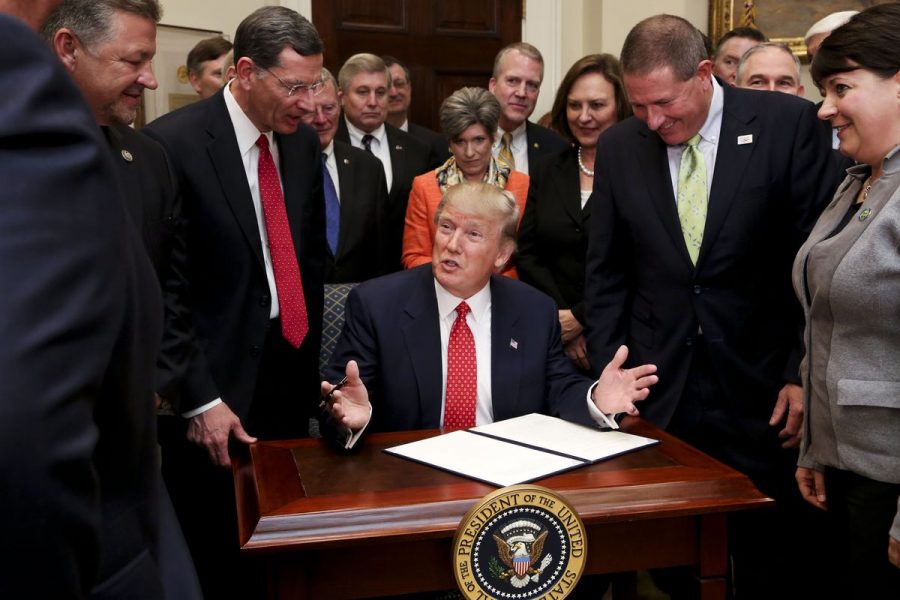President Trump repeals Obama’s Clean Water Act
January 9, 2019
This past month, Trump’s administration has worked with the EPA to repeal to the Obama-era, Waters of the United States rule (WOTUS), which was put in place to protect smaller bodies of water from pollution.
On February 28th, 2017 Trump signed an executive order to work towards suspending Obama’s act and on December 11th, 2018 they officially repealed the law.
Obama’s WOTUS law was born from the Clean Water Act (CWA), which was enacted in 1972 and outlined laws and regulations surrounding water pollution. The CWA made it illegal for anyone without a permit to dump point source pollution into navigable waters and it determined standards for water quality. It also funded sewage treatment plants to sustain clean water.
However there was ambiguity surrounding which waterways were protected. All large bodies of water were unarguably covered by the law but everything else was resolved on a case-by-case
basis. This caused confusion and inequity, so in June 2015 Obama’s administration created the Waters of the US rule to combat that. Instead of smaller bodies of water being treated case-by-case, they were automatically protected if they had a bed, bank, or high water mark. Wetlands were also protected if they were within 100 feet of a larger body of water.
These specific rules were intended to make regulating water easier and clean water more accessible.
The issue people had with it which Trump recognized was the impact it was having on farmers.
The WOTUS affected farmers because ponds, irrigation systems, or rivers that were near to their crops could be regulated. Farmers tended to use fertilizers which can run off into nearby streams
or ponds. In addition farmers were feeling confused by the Waters of the US rule and felt mistrust with the EPA.
According to the American Farm Bureau Federation, “It expands federal jurisdiction far beyond what was authorized by Congress, resulting in the imposition of burdensome requirements, widespread uncertainty and legal risk for farmers and ranchers.”
In response to similar objections to WOTUS, Trump decided to rescind it. President Trump is taking out the specificity of Obama’s act by only regulating large bodies of water, therefore taking the strain of regulations off of farmers. The EPA and United States Army commented to the public on the EPA’s official website.
“This proposed rule would provide clarity, predictability, and consistency so that regulators and the public can understand where the Clean Water Act applies—and where it does not. Such
straightforward regulations would continue to protect the nation’s navigable waters, help sustain economic growth, and reduce barriers to business development.”
However, this has caused controversy from environmentalists.
In a Vox article, Jon Devine a lawyer with The Natural Resources Defenses Council says, “But if you can only regulate the biggest rivers and lakes — and the pollution problem is much
farther upstream — then you’re not effectively protecting the receiving water or the watershed.”
Without protecting smaller bodies of water through legislation, it is left up to individual people to keep the water clean for everyone else. Wetlands for example are a key ecosystem carrying
many organisms and they also protect against erosion, improve natural water quality, and protect from floods. If pollutants such as fertilizer, sediment, human sewage, animal sewage, road salts,
pesticides, and heavy metals get inputted into the ecosystem, it can be severely detrimental for the animals living there. By only protecting larger bodies of water, it does not necessarily filter
out or prevent toxins that are going into small bodies of water and eventually larger bodies of water.
This means that the water humans are drinking can still end up being contaminated. It also means that small aquatic ecosystems are being threatened through this repeal of legislation.
Although this is a nationwide problem there are things that each individual can do to help the issue. If there is a concern within a community about the quality of the water or the lack of
regulations to preserve clean water, call city council members, state representatives, the mayor, or the water treatment plants to bring up the concern.
Another way to drink cleaner water is by using tap or filtered water instead of bottled water. There tends to be stricter regulations on tap water since it is regulated under the Safe Water Drinking Act by the EPA, rather than the FDA which has looser testing policies.
In addition using a metal reusable water bottle instead of a plastic reusable bottle is a good idea since plastic has various chemicals that can get into the water. Even if it is marketed as BPA free, which is a harmful toxin that interrupts hormonal function, there are other chemicals similar to BPA that can still cause harm.
Finally some other ways to reduce pollution is to not dump any chemicals down the sink, be sure to dispose of hazardous materials correctly, use eco-friendly shampoo and conditioner, go to a car wash instead of doing it yourself to reduce soap runoff, learn more about ecological impacts, and volunteer with an environmental activist groups.
State representative for 9th district (Renton, Tukwila, Kent, Des Moines): Adam Smith
https://adamsmith.house.gov/contact
Renton City council members: https://rentonwa.gov/city_hall/city_council
Renton Mayor: Denis Law https://rentonwa.gov/city_hall/mayor
Learn about your impact on the world by calculating your ecological footprint:
https://www.footprintcalculator.org/
Wastewater Utility Engineering:
https://rentonwa.gov/city_hall/public_works/utility_systems/wastewater_utility_engineering
South Treatment Plant: https://www.kingcounty.gov/depts/dnrp/wtd/system/south.aspx
Eco-friendly shampoo, conditioner, and other products:
Package Free Shop https://packagefreeshop.com/collections/hair-care-go-tos
Recology https://www.recology.com/recology-cleanscapes/burien/
Eco Collective https://ecocollectiveseattle.com/
Environmental volunteer groups:
Earth Corps https://www.earthcorps.org/volunteer/what-to-expect-at-a-volunteer-event/
Student Conservation Association https://www.thesca.org/serve/youth-programs






